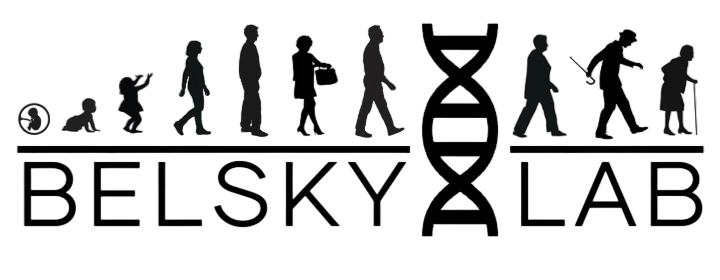Genetic Analysis of the Dutch Hunger Winter Families Study to Boost Rigor and Robustness for Testing In-Utero Famine Effects on Aging-Related Health Conditions and Biological Aging (R01AG066887).
Project Abstract
Gestational timing of exposure to famine in the Dutch Hunger Winter Families Study. The figure shows individual gestations of N=547 famine-exposed participants (colored lines) and N=176 time controls (gray lines). Each gestation is plotted as a single horizontal line.The start of the line is the date of the mother’s last menstrual period (LMP). The end of the line is the participant’s date of birth. Individual gestations are plotted from the top of the graph to the bottom, ordered by LMP date. For the famine-exposed participants, the segment of each line showing the first 10 weeks of gestation is colored gold. The segment showing the second 10 weeks is colored orange. The segment showing the third 10 weeks is colored red. The segment showing the last 10 weeks is colored purple. For the time controls, 10-week gestational periods are colored in gray, with lighter shades for the earlier gestational periods. The x-axis shows the date. The vertical dashed lines show the start and end of the famine exposure period (November 26, 1944 -May 12, 1945).
With LH Lumey: The graying global population makes interventions to extend healthy lifespan a public heath priority. Health insults during the perinatal period are linked with risk for aging-related health conditions, including obesity, type 2 diabetes, and cardio-metabolic disease. If these associations are causal, interventions to prevent perinatal insults and to reverse their biological damage could delay disease onset and prolong healthspan, the length of time a person remains healthy. However, establishing causal long-term health effects of perinatal insults in humans is challenging. Randomized trials would be unethical. Observational studies can be biased by confounding factors that erroneously suggest a link between insults in the perinatal period and later health. In contrast, natural experiments can isolate the impact of perinatal insults on adult disease and healthspan. The Dutch Hunger Winter Families Study (DHWFS) uses a sudden, war-induced famine as a natural experiment. The famine was caused by a Nazi blockade during WWII in 1944-45. Because the impact of famine was immediate, transient, and population-wide, DHWFS comparison of infants born during the famine with those born before or after the famine will identify potential long-term effects of perinatal insults. However, famine natural-experiment studies, including DHWFS, may be vulnerable to selection bias. Birth rates decline significantly during famine; a famine’s impact on fertility and fetal/infant survival might bias famine studies of the long term effects of perinatal insults in unknown ways. To fill this gap in knowledge, we will genotype stored DHWFS bio-specimens from 956 individuals, 37% of whom were exposed to famine in-utero and the remainder of whom are siblings of the famine-exposed individuals or “time controls” born immediately before or after the famine. We will link new genetic data with participants’ existing clinical and cognitive tests and blood DNA methylation data. We will examine in this integrative multi-omics database the potential impact of selective fertility and fetal/infant survival during the famine on (i) genome wide genetic characteristics; (ii) differences in polygenic risk scores for specific aging-related health conditions; and (iii) differences in methylation quantitative trait loci (mQTL) genotypes. We will then conduct genetics-informed analyses of famine effects on obesity, type-2 diabetes, cognitive reserve, and epigenetic aging. Using these new resources, we will prepare an integrated multi-omics database of the DHWFS population for use by outside research teams and generate a one of a kind resource for famine and perinatal insult research. The proposed project will generate a new knowledge base to further examine biological pathways that are likely to connect perinatal events to adult health and aging through genetic and epigenetic mechanisms.
Featured Publication: Cheng M#, Conley D, Kuipers T, Li C, Ryan CP, Taubert J, Wang S, Wang T, Zhou J#, Schmitz LL, Tobi EW, Heijmans BT, Lumey LH, Belsky DW*. Accelerated biological aging six decades after prenatal famine exposure. Published online November 4, 2023:2023.11.03.23298046. doi:10.1101/2023.11.03.23298046
Featured Publication: Zhou J#, Indik CE, Kuipers TB, Li C, Nivard M, Ryan CP, Tucker-Drob EM, Taeubert JM, Wang S, Wang T, Conley D, Heijmans BT, Lumey LH, Belsky DW*. Genetic analysis of selection bias in a natural experiment: Investigating in-utero famine effects on elevated body mass index in the Dutch Hunger Winter Families Study. American Journal of Epidemiology, Published online October 2, 2024.
Jiayi Zhou, MPH.
Featured Publication: Taeubert, M.J., Kuipers, T.B., Zhou, J.# Chihua Li, Shuang Wang, Tian Wang, Elmar W. Tobi, BBMRI-NL Metabolomics consortium, Daniel W. Belsky, L. H. Lumey & Bastiaan T. Heijmans. Adults prenatally exposed to the Dutch Famine exhibit a metabolic signature associated with a broad spectrum of common diseases. BMC Med 22, 309 (2024). https://doi.org/10.1186/s12916-024-03529-2
Jazmin Taeubert








